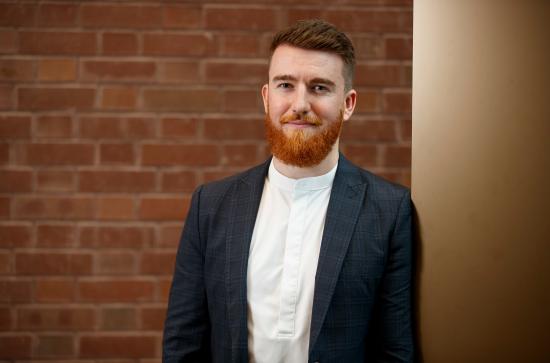David Pollard

Bachelor of Arts (Geography and English)
2012
Just how David Pollard ’12 came to be featured in a Forbes magazine article illustrates the round-about ways in which milestones in his life have often resulted from a perfect triumvirate of chance, luck and resilience. In 2018, a journalist from Forbes wrote a piece offering businesses advice on how assistive technologies can make workplaces more disability-friendly. She wrote, “Once you hear David Pollard speak about helping people with disabilities, you’ll be a convert to the power of assistive technology. In fact, you will probably wonder why more U.S. companies aren’t doing exactly what he and his colleagues are doing in Ireland.”
As Innovation Projects Manager at The Rehab Group, Pollard travels around centres in Ireland “understanding a person’s challenges as opposed to their disability” and looks for solutions, often with technology. Maybe it’s as simple as finding the best free app for someone who is deaf so others can communicate with them. Or maybe it’s something even more life-changing. The Forbes piece features Pollard assisting one of the people he works, Lisa, to improve her work and home environments and increase her independence.
He created a smart room for Lisa at the centre. Using cheap and mainstream technologies like Bluetooth blinds from Ikea and linked via an Amazon Alexa, Lisa was able to control her environment more independently, which meant doing everyday things such as turning on Netflix, turning on and off the lights, or sending messages and calls using eye-tracking technologies.
“Lisa has challenges verbally communicating, but we worked out a system to enable her to communicate what she wanted, when she wanted,” Pollard said. “One day earlier this year, using the technologies provided to her, Lisa let the staff know remotely that she’d be late coming into the centre. An hour later, her mom called to tell them the same thing but they already knew because Lisa had done it completely independently. This might seem like a trivial thing to many of us, but having this independence to simply let someone know your plans is empowering.” Small-scale interventions like this are at the heart of Pollard’s work, but it’s been through building networks online and in the start-up scene where his efforts are being magnified—and in a big way.
The Forbes journalist discovered him leading a Twitter chat about education, accessibility and inclusion that went viral. He co-founded Learning Tech Labs, “a community of Educators, L&D professionals, Entrepreneurs, Developers, Designers, and anyone interested in changing the face of learning. With over 3,300 members, Learning Tech Labs is one of the fastest growing EdTech communities in Europe.” He recently stepped away from the company to found Start-up Week Dublin, supported by Dublin City Council and Enterprise Ireland. This sees over 5,000 people throughout Dublin attend over 70 events in the city over 5 days to celebrate entrepreneurship and innovation.
Without a doubt, Pollard has carved himself a unique career niche at the intersection to of accessibility, inclusion, technology, education and entrepreneurship. Getting there, however, was anything but straightforward.
The Offaly native failed maths on his Leaving Certificate and failed second year twice during his Arts degree at Maynooth. But in 2012, when he graduated with a degree in English and Geography after five years—“the longest arts degree in history,” he said—he focused on what he took from the experience, not where he came up short.
“Achieving my arts degree was one of my proudest moments, even though it took so long. It’s always been the foundation for me. The fact I did it was so important for me, the resilience it teaches. If I hadn’t gotten through the arts degree I don’t think I would have gotten through my Master’s.”
On his academic struggles to that point, he said, “It was based on my own lack of understanding about how to learn.” From then on, thinking about just how people learn became a theme in his work, as was the subject of resilience.
Through his Master’s degree he found some of the most resilient people he’d ever met, people within the disabled community.
After sending out 50 applications for his teaching practice, he was placed by Rehab Group affiliate National Learning Networks to work with individuals with intellectual disabilities. “I loved it from Day One. It was fun in the classroom with my learners, but I also saw first-hand the limitations set by society and that frustrated me so much.”
So Pollard started connecting these communities of people to the tech world, introducing 3-D printing, coding, and robotics. He started running an inclusive coding environment at TCD’s Science Gallery and ran an accessibility hackathon in Dublin with the support of the Dublin City Council. Pollard reflected on his career path: “After college I reflected on my failures and realized that I hadn’t immersed myself into the learning contexts I was in and felt disconnected. To ensure this didn’t happen again, I decided to create my own immersive learning experiences, built a personal learning network around me, and asked questions of everyone I met. I accept that I’m privileged to have a second chance, so my goal is to create—I hope—positive opportunities and paths for others.”
